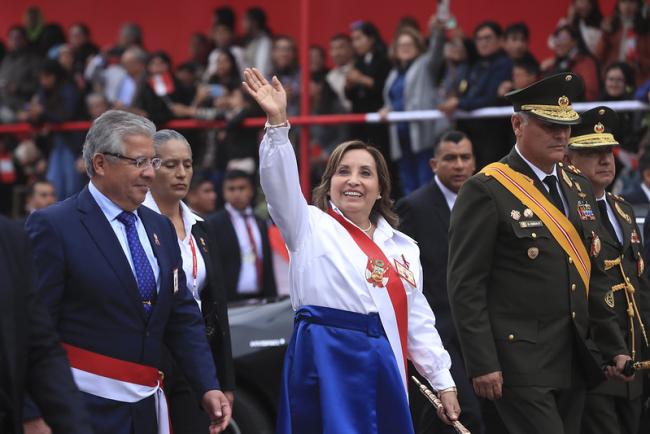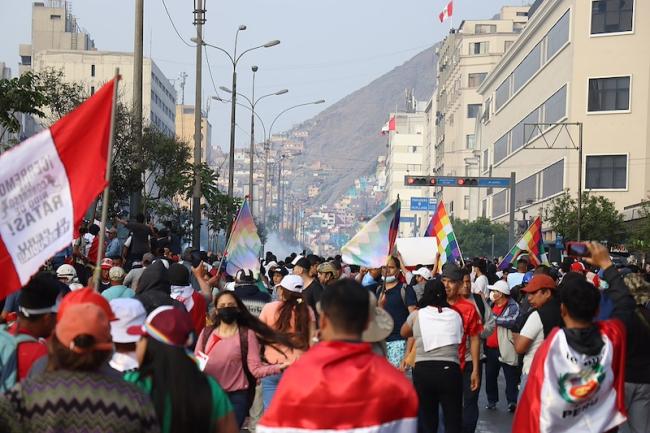
Leer este artículo en español. Translated from Spanish by Lucas Bricca.
The rise of the far right in Peru didn’t happen at the ballot box. After the fall of former President Pedro Castillo in December 2022, his constitutional successor, Dina Boluarte, assumed power thanks to a pact with the conservative and authoritarian congressional majority. The pact, sealed with the blood of 49 people during the first wave of protests against the Boluarte government, took the country from a precarious and isolated president with little commitment to democracy or the leftist sectors that supported him to a president who represents various networks of economic power and far-right interests in their purest form. The regime, which governs with absolute disregard for its people, is despised. This pact has turned the state into a repressive apparatus and benefactor of criminal groups.
There is no shortage of examples. Peru’s Congress has been passing laws that directly benefit economic groups that were subject to sanctions and oversight in recent years. With the so-called "Anti-Forest Law," lawmakers regularized the legal status of logging companies in the Amazon by declaring that, as long as the companies are in possession of an area, they are allowed to deforest it. By expanding the registry of "informal miners," authorities validated a system that has long preyed on the environment and local communities’ human rights, especially those of women and girls subjected to human trafficking.
It doesn’t end there. The government has been approving regulations that eliminate the possibility of effective oversight in various sectors, from corporate universities, whose owners became wealthy by offering programs without basic teaching standards, to political parties themselves, some of which have faced investigations for money laundering. Other regulations directly benefit organized crime, such as one requiring that court-ordered search warrants be carried out "in the presence of the lawyer," making the measure ineffective in practice.
Those in political power have even extended benefits to perpetrators of crimes against humanity. Going against international treaties, Congress introduced a statute of limitations for these crimes, benefiting military officers who ordered and carried out rape, torture, and murder during the internal armed conflict.
These kinds of policies are being approved every day by an extreme right-wing alliance that came to power promising an effective, technocratic, and democratic government. Today, the de facto powers, once at the margins of legality, now have operatives and representatives who openly approve and implement laws and policies in their favor.
More than Clientelism
One could argue that what is happening in Peru today is nothing new. Since the origins of the Republic, the state has been conceived largely as an opportunity for plunder. The struggle between economic elites for access to privileges and public benefits, corruption schemes, and white-collar crime was carried out secretly or with straw men to disguise their immorality.
Theorists of underdevelopment and their concepts of paternalism, clientelism, and corruption have described how these mechanisms have functioned on the margins of legality or, at times, in the shadows of legality, taking advantage of regulatory ambiguities or achieving "momentary benefits" such as tax privileges for extractive economic sectors during the developmentalism of the 1970s. When he spoke of "lumpen-States" five decades ago, Andre Gunder Frank was alluding to this history of mercantilism and extractivism that benefited local elites and their international partners. Lumpen is a metaphor for operations that kept states underdeveloped—operations so immoral, so unjust that they bordered on criminality.
But the lumpenness of today's Peruvian state is not a metaphor, and it does not border on criminality. It is, in many ways, the victory of criminality. A lawyer who made his career defending criminals and corrupt police has become the minister responsible for internal order. One of the most bloodthirsty and corrupt former presidents in the region, Alberto Fujimori, has not only been illegally pardoned but granted a lifetime pension.
These are no longer immoral acts to be hidden or covered up. They are displayed openly, without shame, to show the victory of those who advanced in their political, business, and military careers by trampling on the law, the constitution, and citizens’ rights.
More than "Political Atomization”
In political science, the dominant explanation for this situation is the "weakness of political parties," "atomization and political fragmentation," or the "dilution of power." This is reflected in the fact that the parties have become private, family, or corporate enterprises without basic policy agendas, causing citizens to become "disaffected" from politics, with no desire to organize political opposition. However, this assessment is very limited.
If we analyze social mobilization at the sub-national level, in the Indigenous organizations of the Amazon and in human rights and environmental activism, people have not ceased to mobilize or engage in politics. In fact, they intensified their involvement when Dina Boluarte assumed power. According to data from the National Coordinator of Human Rights, from 2001 to 2024, public forces injured more than 3,000 people during social mobilizations, with 217 killed in the repression. According to this data, in just the first three months of Dina Boluarte's government, state agents killed 49 people, injured more than 900, and arbitrarily detained over 1,200. Are people not protesting because of disaffection but because of criminalization and the threat of death?

The atomization of political parties is not a cause but a symptom, which alone does not explain the roots of institutional degradation. To understand this, we must examine how the logic of neoliberalism has been imposed at all levels, in a context of racism and systematic political and social exclusion. Fujimori’s decade in power from 1990 to 2000 not only attacked and dismantled grand programmatic narratives and "traditional parties"; it was also a biopolitical attack, in the most visceral sense of the term, against the trade union left, social movements, and Indigenous and peasant movements. In a context of past and present colonialism, racism, and exclusion, the Fujimori era legitimized the idea that the poor were to blame for their poverty, that forced sterilizations in rural areas were justified, and that popular politics was a form of terrorism that had to be suppressed.
With the fall of Fujimori, many assumed Peru would overcome these narratives in a process of democratic transition. This was never realized, however, and the idea of reaching a new social pact was tossed out. Despite discourses of transition, reconciliation, and human rights, conservative forces persisted in their discourses of anti-rights, racism, and terruqueo (the labeling of political opponents as terrorists or terrucos). Post-Fujimori governments often officially validated these discourses whenever civil mobilizations over social or environmental issues challenged economic growth. In fact, with the exception of timid reforms pertaining to culture, the environment, and social inclusion, these governments deepened the economic institutions that sustained the neoliberalism of the 1990s. Many people had no choice but to rationalize what Veronica Gago calls "neoliberalism from below." The “business parties” (partidos-empresa) respond to this reality.
The basic problem, then, is not the atomization of political parties. The problem is the political exclusion of the popular sectors as a result of social exclusion, racism, terruqueo, and the criminalization of activism. All of this is encouraged by an anti-transition and anti-human rights discourse that remains in force, preventing the possibility of reaching a minimum agreement of coexistence through which political groups would truly represent the interests of diverse social sectors. Today, the anti-transition forces are capturing the entire public apparatus, shamelessly forging pacts with the economic powers—economic elites or heirs of the aristocracy—from above and with illegal economic actors from below.
A State in Dispute
Civil society in Peru feels isolated and unprotected, at the mercy of the extreme right that governs without counterweights. Not even pronouncements from international organizations have prevented authorities from continuing to pass laws and implementing pro-crime and impunity policies.
The Inter-American Commission and the Inter-American Court of Human Rights issued declarations against the pardoning of Alberto Fujimori and the law that protects perpetrators of crimes against humanity during the internal armed conflict. Special rapporteurs of the United Nations made similar declarations. The embassies of Canada, the United Kingdom, Germany, and Norway issued a joint statement criticizing the law that favors deforestation of the Amazon. The Anti-Corruption Committee of the OECD, which Peru is seeking to join, sent a letter to the Peruvian government expressing its concern over a law that weakens "effective collaboration" in the fight against organized crime.
For the self-styled "sovereigntist" and "anti-globalist" extreme right, none of this can influence internal affairs. It is not alarmist to say that Peru is authoritarian and firmly on its way to becoming a full-fledged dictatorship. After taking over, together with their allies, autonomous bodies such as the Constitutional Tribunal and the Ombudsman's Office, the extreme right-wing is seeking to exclude their political adversaries from the next elections and to remove the president of the National Elections Jury in order to appoint one that serves their interests. Several bills of this nature, and others that grant the political elite the prerogative to control judges and prosecutors, seek to formalize the dictatorial essence of the regime.
Social organizations, as they have done in the past, can only persist. The international community and academics must speak out more forcefully, and public actors themselves must fight the battle from within. Because it is obvious that when I say that the Peruvian state is a lumpen state, I am not referring to every office and official of the state. I am referring to the power networks that dominate Congress, the government, and certain autonomous agencies.
The state is in dispute, and a few spaces of resistance remain within the judiciary, the Prosecutor’s office, regional and local governments, and the ministries themselves. However, there must be a common narrative—a minimum agreement. The only way to resist the onslaught is to be clear that the immediate articulating political project in Peru must be to de-lumpenize politics and the state.
Roger Merino is an associate professor at the Universidad del Pacífico in Lima, Peru. He researches topics related to political ecology, environmental governance, and human rights.

